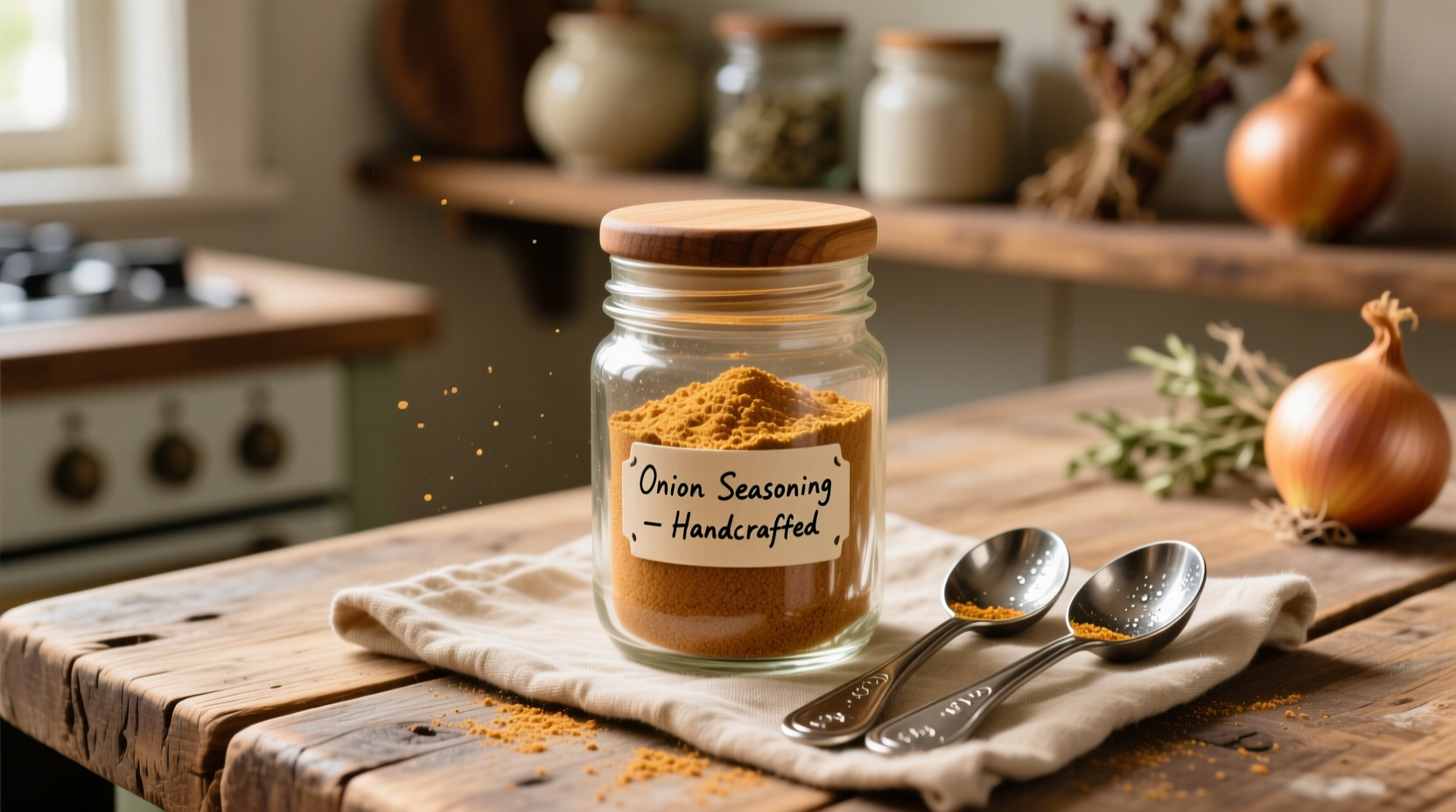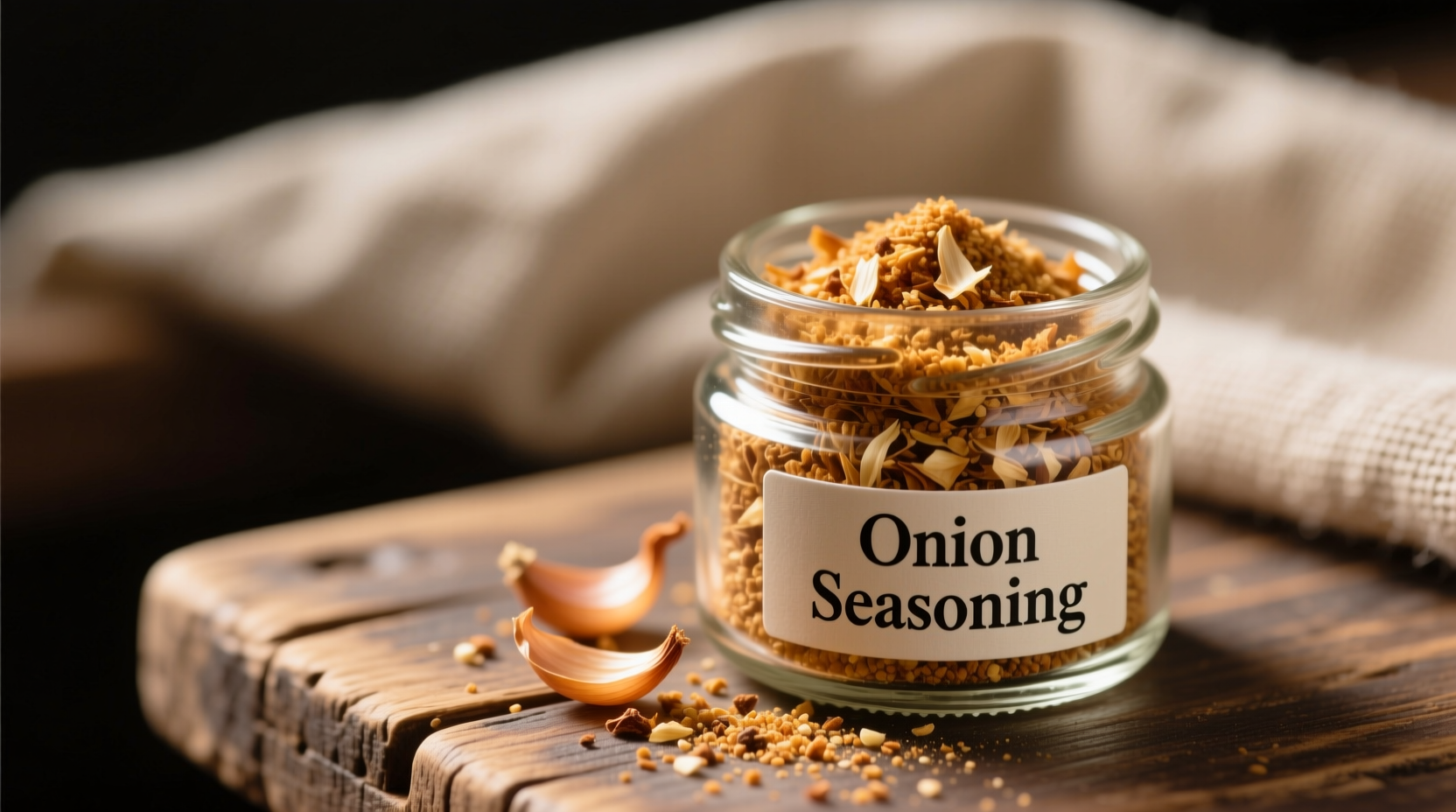Discover how this kitchen staple can transform your cooking with consistent onion flavor that's ready to use anytime. Whether you're a beginner cook or seasoned chef, understanding onion seasoning unlocks new dimensions in flavor development while saving valuable prep time.
What Exactly Is Onion Seasoning?
Onion seasoning differs significantly from plain onion powder. While onion powder contains only dehydrated onions, onion seasoning is a carefully balanced blend designed to deliver complete flavor profiles. Most commercial versions combine:
- Dried onion flakes or powder (the base)
- Salt (typically 30-40% of blend)
- Garlic powder (complementary flavor)
- Paprika or other mild spices (color and depth)
- Herbs like parsley or oregano (in some blends)
| Characteristic | Onion Seasoning | Onion Powder |
|---|---|---|
| Primary Ingredients | Onion + salt + garlic + spices | 100% dehydrated onions |
| Sodium Content | High (30-40%) | Negligible |
| Flavor Complexity | Balanced, ready-to-use profile | Pure onion flavor only |
| Best Applications | Dry rubs, seasoning blends, quick dishes | Cooking applications needing pure onion flavor |
Why Onion Seasoning Works Better Than Fresh Onions in Many Applications
Professional chefs rely on onion seasoning for specific culinary advantages that fresh onions can't match:
- Consistent flavor - No variation between batches unlike fresh produce
- Moisture control - Won't release water that dilutes sauces or prevents proper searing
- Flavor concentration - 1 tablespoon equals approximately 1/2 cup fresh onions
- Time efficiency - Eliminates chopping, reduces cooking time for flavor development
According to the Culinary Institute of America's flavor science research, dried onion products undergo Maillard reaction compounds during dehydration that create deeper umami notes compared to raw onions. This explains why many professional recipes specifically call for dried onion products rather than fresh.
Practical Applications: When and How to Use Onion Seasoning
Understanding the context boundaries for onion seasoning prevents common kitchen mistakes. This versatile ingredient shines in specific applications while falling short in others.
Best Uses for Onion Seasoning
- Dry rubs for meats - Adheres better than fresh onions and creates perfect crust
- Seasoning for roasted vegetables - Even distribution without moisture interference
- Quick sauces and gravies - Dissolves instantly without texture issues
- Homemade spice blends - Forms the base for Chicago steak seasoning, everything bagel seasoning
- Convenience dishes - Adds instant flavor to boxed mixes, canned soups
When to Avoid Onion Seasoning
- Recipes requiring fresh onion texture (salsas, salads)
- Dishes where salt control is critical (onion seasoning contains significant sodium)
- Long-simmered dishes where fresh onions develop better flavor complexity
Creating Superior Homemade Onion Seasoning
Commercial onion seasoning works well, but homemade versions let you control ingredients and avoid anti-caking agents. Here's a professional chef's approach:
Basic Homemade Onion Seasoning Recipe
- 1/4 cup high-quality onion powder (check for no added ingredients)
- 2 tablespoons fine sea salt
- 1 tablespoon garlic powder
- 1 teaspoon paprika (for color and mild sweetness)
- 1/2 teaspoon dried parsley (optional for visual appeal)
Mix thoroughly in a glass bowl, then store in an airtight container. For enhanced flavor, toast the onion powder in a dry skillet over low heat for 2-3 minutes before mixing - this deepens the flavor profile through additional Maillard reactions.

Storage Guidelines for Maximum Freshness
Proper storage maintains flavor potency. The National Center for Home Food Preservation recommends:
- Store in airtight containers away from light and heat
- Keep in a cool, dark cupboard (not above the stove)
- Maximum shelf life: 12-18 months for optimal flavor
- Signs of degradation: Faded color, weak aroma, clumping
Unlike fresh onions, dried onion products don't require refrigeration. The USDA Food Safety and Inspection Service confirms that properly stored dried seasonings remain safe indefinitely, though flavor diminishes over time.
Smart Substitutions When You're Out
Running out of onion seasoning doesn't have to ruin your meal. Consider these alternatives based on your recipe needs:
- For dry applications: Mix 1 part onion powder + 1/2 part salt + 1/4 part garlic powder
- For moist applications: Sauté 1/4 cup finely minced shallots per teaspoon of seasoning called for
- Sodium-sensitive diets: Use pure onion powder and adjust salt separately
- Flavor boost alternative: Caramelized onion powder (available specialty stores)
Remember that substitutions change the flavor profile slightly. As noted in The Flavor Bible by Karen Page, onion powder provides pure allium flavor while onion seasoning delivers a balanced savory profile thanks to its additional ingredients.











 浙公网安备
33010002000092号
浙公网安备
33010002000092号 浙B2-20120091-4
浙B2-20120091-4